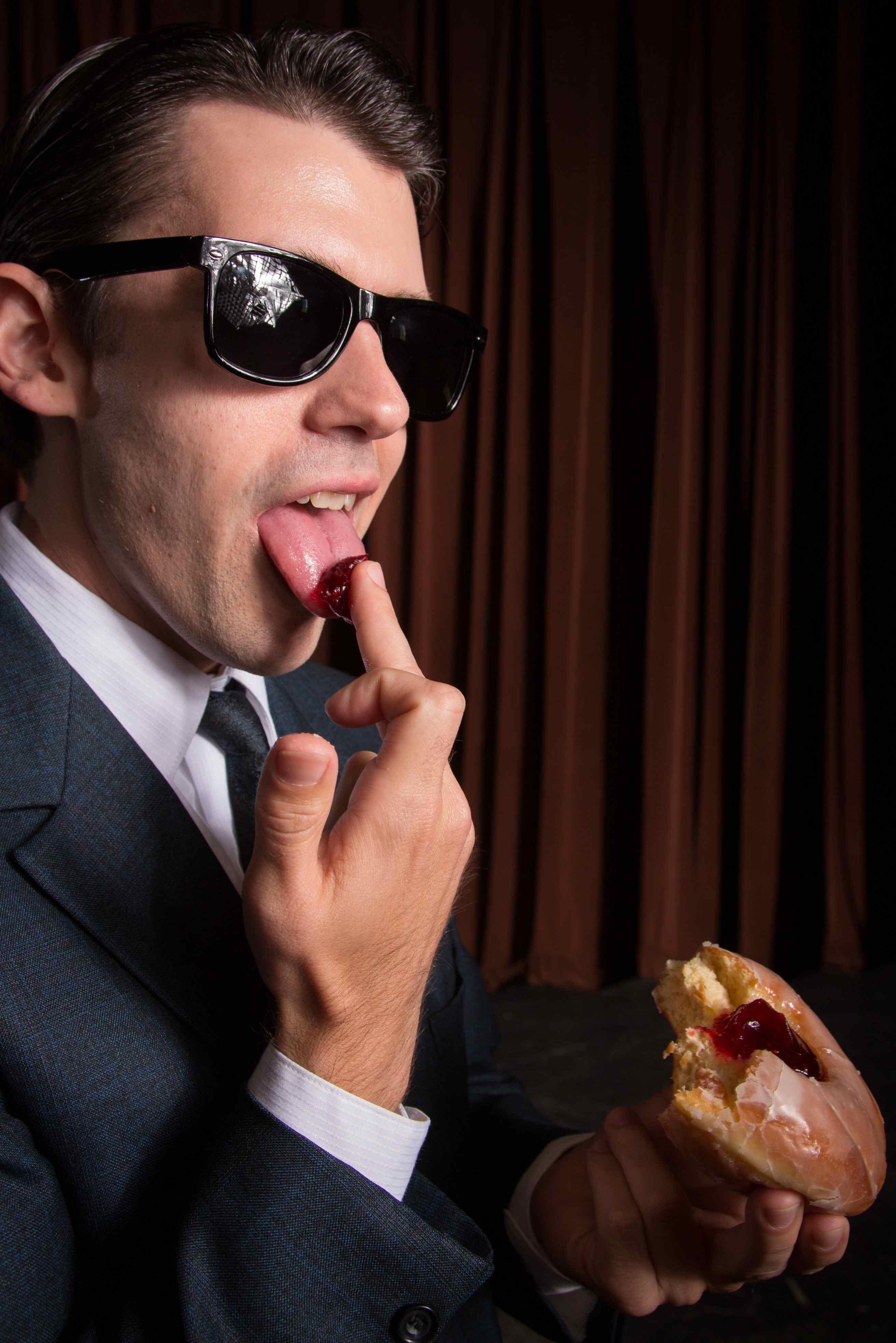It’s time, once again, for another evening of fine dining and pleasant performance from Café Nordo. This peripatetic food theatre company integrates menu and plot and this time around they frame their agitprop performance in the world of the spaghetti Western with Smoked! (through June 16; tickets). It’s a fitting genre for Terry Podgorski’s often-ripe dialogue; thankfully, the cuisine one encounters is a far cry from the frontier.
For this Old West story, Café Nordo sets up shop in Pioneer Square at The Kitchen, Delicatus’s event space. There’s a Zane Grey feel to the space with lots of rough, unfinished wood, bat wing doors from the foyer, and a bulky bar backed by a long line of identical anonymous bottles of caramel-colored drink. A Palouse-like image is visible above those bottles. In one of the finer touches in this event the rolling hills shift from late afternoon to early evening over the course of the show.
As with all Café Nordo performances Smoked! features a plot that preaches to the choir against the evils of agribusiness. This doesn’t reveal anything new about spaghetti Westerns or agribusiness, but it’s a good time. We come to care about the characters and their fates more than the issues with which they wrestle.
Those characters include Clara (Café Nordo regular Opal Peachey), the saloon keeper who tries to keep her town together and her friends from harm. Peachey is joined by fellow alumni Maximillian Davis and Evan Masher. In the roles of Eli and Travis they give us the sort of vulnerable, simple men who populate this genre to contrast with the Clint Eastwood characters.
That gunslinger for good in is played here by Seattle’s go-to tough-guy actor, Ray Tagavilla. This nameless stranger looking for a drink and a hot bath quickly becomes embroiled with the town boss’s stooges The Advocate and “Mad Dog” Maddie (Ryan Higgins and Kate Hess). These villains are two sides of madness, one cold, controlled, and calculating, the other violent and unstable. The cast of capable actors rounds out with the obligatory sheriff and bar maids and, the most important character, the food itself.
Transitioning from the play to the food is the biggest dramaturgical challenge in Café Nordo shows. Director Erin Brindley and writer Podgorski are getting better at meeting that challenge but they have yet to master it. Where other shows might have a blackout between scenes, at Café Nordo, the audience gets a series of intermissions. During each break, the cast presents a course and its optional cocktail accompaniment (one may alternatively or additionally purchase drinks from a menu). Since the actors serve in character, the show must establish the audience’s role in the plot and a reason for the characters to serve us.
In Smoked! the audience has come to town to see a hanging that our protagonists are determined to stop. They don’t seem to mind our presence or purpose all that much but they don’t have a reason to serve us either. For the first course we are fed because it’s Maddie’s whim and she has a loaded gun. The later reasons are only a little more natural.
Overall the food outshines the acting and text. The third course, a sunflower seed risotto with garlic scape pesto, is the weak link in the cuisine and even that is pretty good. The loose biscuit of sunflower seeds (not risotto, but what else would one call it?) overwhelms the other flavors without obliterating them. The accompanying whiskey sour balances this nicely.
The final two courses and the final two scenes make up for any weaknesses in the rest of the evening. The oxtail chili is more like an oxtail soup that’s more meat than broth. It’s flavorfully spicy and awfully good. The fried corn pudding melts into it. The vegetarian chili is spicier than the meat with prominent celery. Relief from the heat comes in a dark, serious cocktail of rye, Fernet, and orange bitters.
When the shooting’s done (as it must be) tiny skillets appear on the tables as dishes for rhubarb pandowdy. When combined with fennel whipped cream it makes for a dessert that’s mildly sweet accompanied by a mildly bitter fortified tea. It’s a course that’s over too soon no matter how slowly one savors it.
Anastasia Workman provides the show with her reliably fine compositions that meet the genre while maintaining her personality. However the underscoring is a real highlight, notably in the early scenes, and some later flute work. Most of this features Dayton Allemann who is also responsible for the excellent video work.
K.D. Schill’s costuming is hit and miss. Some pieces look lived in and appropriately distressed but most of the costumes look fresh off the shelf including cartridge belts that have never held bullets. Some skirt hems fall awkwardly and there’s a bolero jacket and corset combination that doesn’t really work as worn.
Podgorski’s dialogue is often stiff and overwrought, which could be used to great effect in this setting but Smoked! aims more toward serious theatre than simply a genre spoof. Still he continues to show signs of growth as a writer with some genuinely funny and original scenes and a complete and well-structured plot. Between those laughs, the action of the later scenes, and the fine meal Café Nordo chalks up another accomplishment in their esoteric field.

